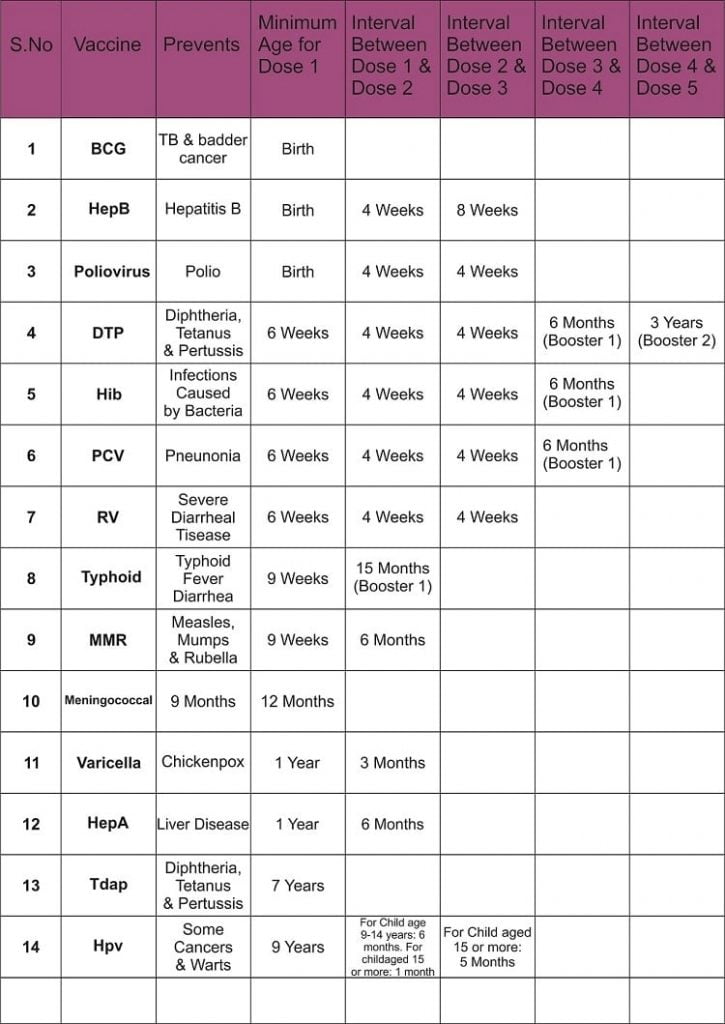
Vaccination Schedule
It is very important for new-born babies and children to get vaccinated against different diseases especially infectious diseases. Many a times, parents have queries about vaccinations and common questions include
Which vaccinations should be given?
When it should be given?
What if parents forget to get their child vaccinated?
What if they have missed the dose?
What if my baby is sick on the vaccination day?
Which vaccinations should be given?
The aim of vaccination is to protect and boost immunity of children against deadly and troublesome infections and diseases. In time vaccination make it sure that the baby is no more vulnerable to diseases and can fight against those diseases. Following the recommended vaccination schedule reduces the incidence of those infections and diseases which means less stress, less pain and less expenditure on the health issues.
When it should be given?
A schedule is being shared and parents should follow this schedule. However, small changes can be made according to individual needs and problems but the most important thing is that all vaccinations should be provided to children to make them safe maximally against the diseases.
For example if you are travelling somewhere and your child cannot receive dose at the particular time than he can also take the dose earlier. Also, if you have missed the dose, you can take it anytime later.
What if parents forget to get their child vaccinated?
Different catch up vaccination schedules is available. So if your child is not vaccinated, even then it’s never too late. You can get your child vaccinated at any age.
What if they have missed the dose?
If you have missed the vaccine dose for days, weeks or months, it’s not a big problem. Most important thing is that you should complete the vaccination schedule.
What if my baby is sick on the vaccination day?
If your child has a minor illness (low-grade fever, flu, runny nose, mild cough, mild diarrhoea), it’s safe to get him/her vaccinated. But if he has a high-grade fever or severe illness, then it’s better to postpone vaccination until he/she gets better.
Importance of vaccines for infants and toddlers:
Breastmilk is enough for new-borns to fight against different diseases. However, once they stop breastfeeding their immunity wears off. Also, some babies do not breastfeed at all.
Vaccines help them to protect from diseases either they are breastfed or not. They also help to prevent spreading disease through hard immunity. Vaccines imitate infections from your child’s body of a certain disease. This will provoke your child’s immune system to formulate weapons which are called antibodies.
Now, that your child’s body is developing antibodies, your child’s immune system will be able to defeat the disease in future.
Are vaccines dangerous?
No, vaccines are not dangerous at all. They are meant to protect your children from many serious diseases. In past, people used to be suffer from serious illness or even die from these disease that vaccines can prevent now. Even chickenpox can be deadly.
Vaccines just causes mild side effects such as swelling and redness on the area where injection is given. These effects can vanish after few days.
Vaccines description:
Description of different vaccines is given below:
HepB:
HepB protects you from infection of a liver called hepatitis B. It is given in 3 shots. It is compulsory in many states to get this vaccine before you enter a school.
RV:
It protects you from a major cause of diarrhoea, called rotavirus. Depending on the vaccine used, RV is given in 2 to 3 doses.
Hib:
Haemophilus influenza type b is a virus that causes bacterial meningitis. Hib vaccine is given to your child to protect him from this disease.
PCV:
PCV is a vaccine that fights against a pneumococcal disease that also includes pneumonia.
IPV:
IPV is given in four doses that protect from polio.
Influenza:
Influenza is a seasonal vaccine that protects from flu and given to your child yearly, starting from the of 6 months. September to May is considered as flu season.
MMR:
This vaccine fight against measles, mumps and rubella. It is given in 2 doses. First dose is given to your child between 12 to 15 months while second dose is recommended in age of 4 years to 6 years.
Varicella:
Varicella is recommended to all healthy children. It is given in two doses.
HepA:
HepA helps your child fighting with hepatitis A. It is given between age of 1 and 2.
I hope your maximum queries have been resolved vaccination for children once you have read through this topic. If still any question, you can contact/visit me.
